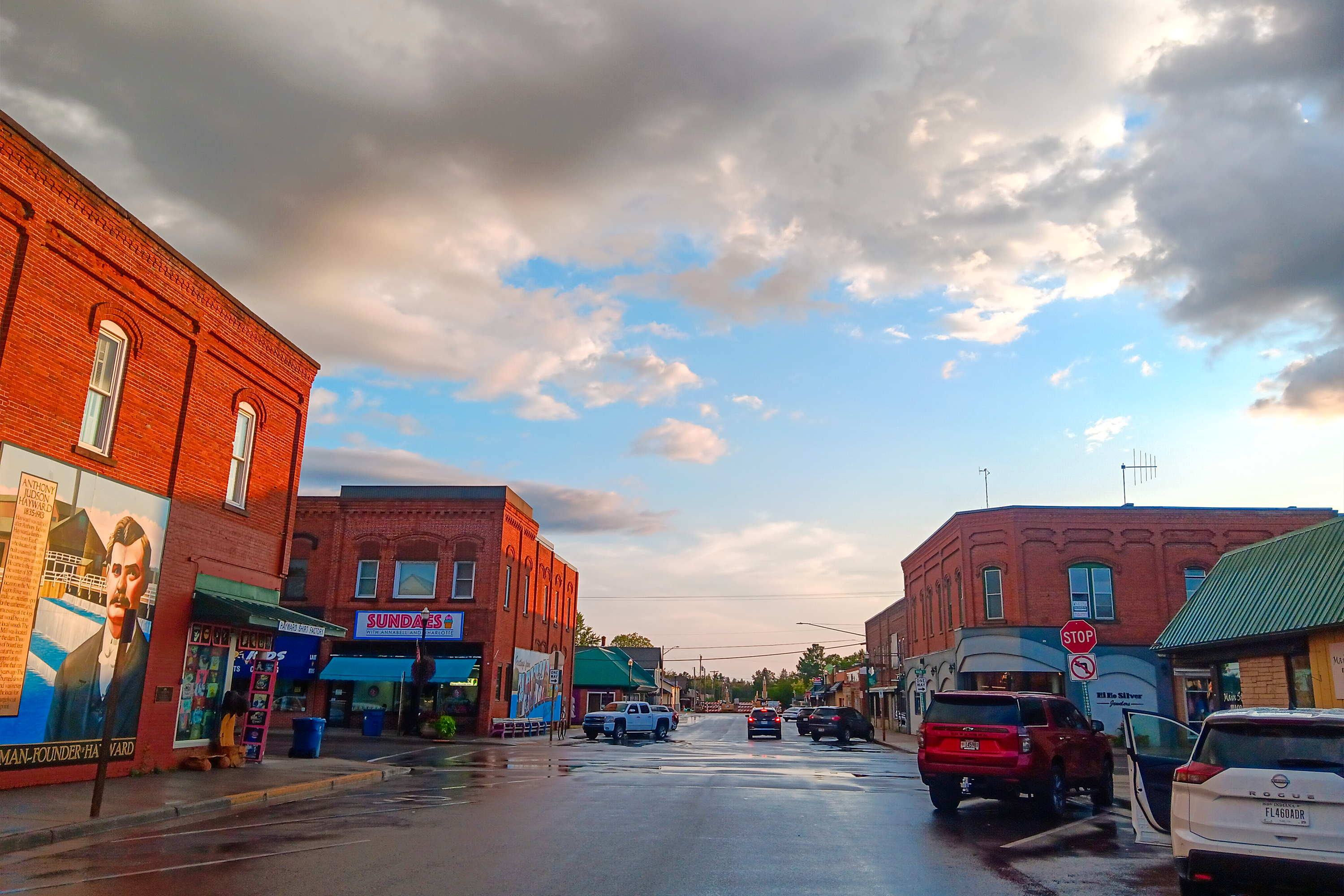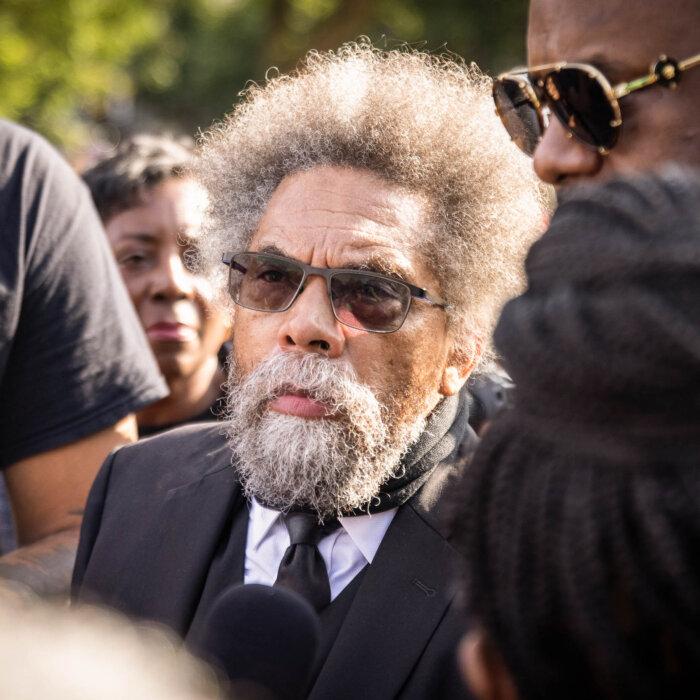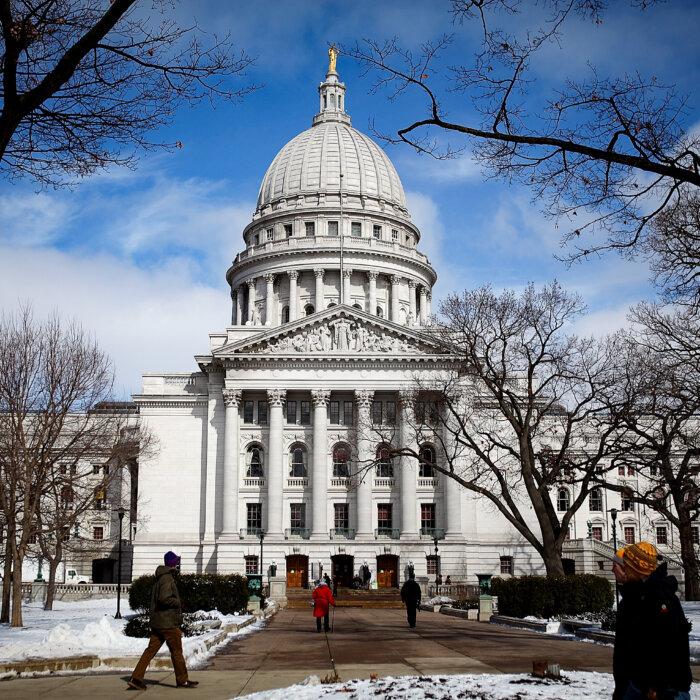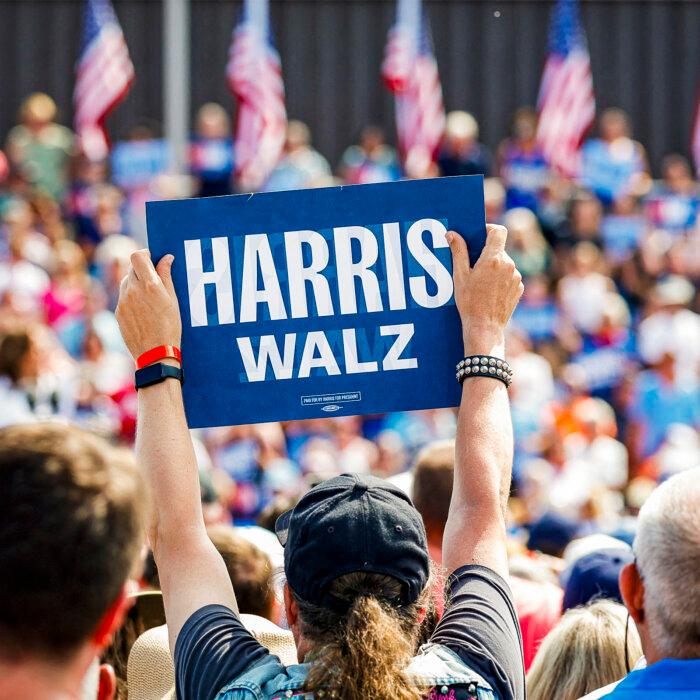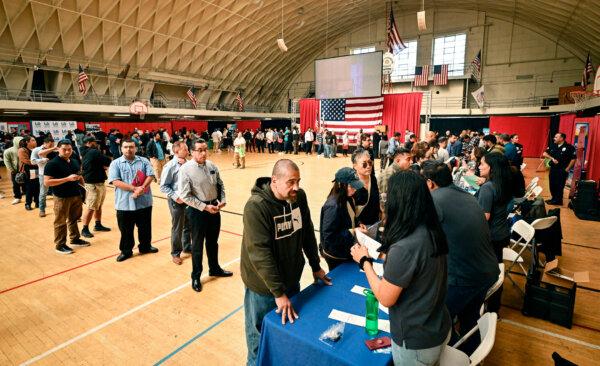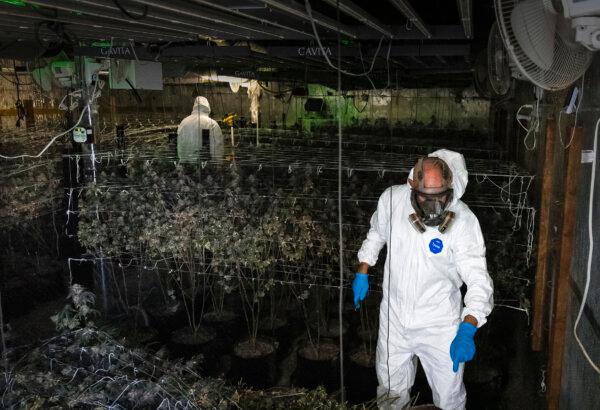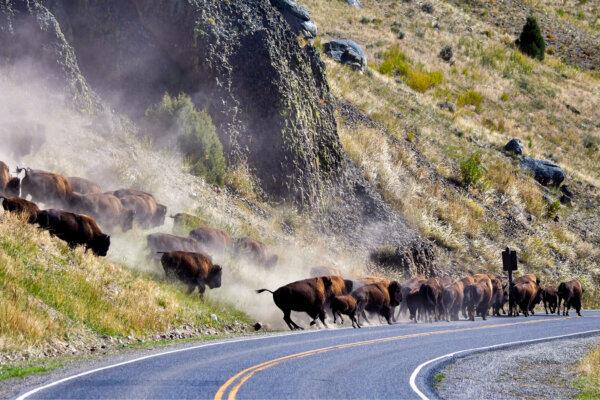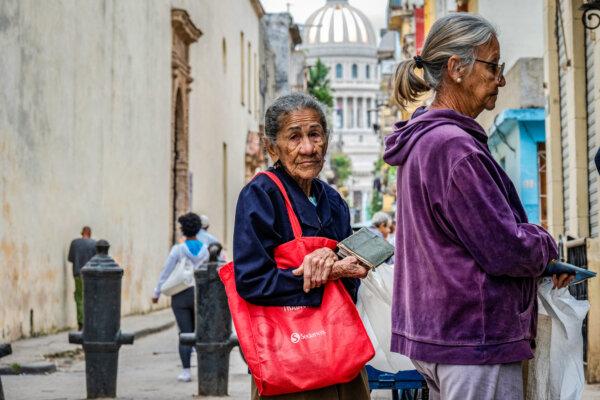“I am a true neutral.”
Matthew Johnson, a short, energetic Texan, was talking politics as he showed off his spread on the south end of Bagley, Wisc., about a thousand feet from the Mississippi River.
There was Abby, the miniature horse from the same sure-footed breed that once worked in the nearby lead mines; his father’s old gravestone protected by a working replica of an early 19th-century signal cannon; and, in a wooden crate, the traditional blacksmithing forge he built. Johnson breaks it out at fairs to reenact life on the American frontier.
Politics, Johnson said, leads to division. People in Bagley try to avoid the subject.
“We’ve got ultra-conservatives, ultra-liberals, and everybody knows that this is not the place to start your crap,” he told The Epoch Times. Behind him, a freight train screamed on its way through town.
Two hundred sixty miles north of Bagley in the state’s Northwoods vacationland, Sawyer County also flipped in 2016. Voter turnout rose that year too.
Once a presidential bellwether, Sawyer broke that streak in 2020 when it stuck with Trump.
Jim Miller, a local Republican and Fourth Ward alderperson in Hayward, theorized that Sawyer’s Republican turn was “part of a national trend where rural counties have become more red and the large metro areas have become more blue.”
“I think Wisconsin and the Midwest have gotten left behind,” Eric Wilson, who was a candidate in the Third District’s Democratic primary, told The Epoch Times when asked why the area trended GOP-ward.
Joan Cervenka, treasurer of the Sawyer County & Lac Courte Oreilles Democrats, wasn’t about to write off her home. She told The Epoch Times that her party has stepped up its presence, participating in parades and, in her words, doing more to “[let] the community know we’re here.”
The Democrats have a highly visible office in downtown Hayward. Local Republicans don’t.
“We’re focusing our efforts on giving money directly to candidates, rather than just having a spot for people to get yard signs,” Miller said of the absence of a physical GOP headquarters.
The Epoch Times traveled across Grant County, Sawyer County, and other parts of western Wisconsin to see just how competitive the region might be.



The View From Bagley
Bagley is in the heart of Wisconsin’s Driftless region. It’s where the glaciers never flattened during the last Ice Age, and it’s a key purple patch on the presidential battleground map.It’s part of the invisible middle, afloat and sometimes thriving but hit hard by price increases and globalization.
Much of the Midwest looks domesticated; the hills, if there are any, roll gently to the horizon, often under a layer of corn, wheat, or soybeans. But in the Driftless, so-called because of the lack of glacial drift, there’s terrain—rocky bluffs, tall trees, and cold-water streams wending their way to the Mississippi, America’s aorta.
On Aug. 10, all-terrain and utility task vehicles (ATVs and UTVs), a common sight throughout the region, crested the hill above the Bagley Cemetery.
Harley-Davidson motorcycles were ubiquitous. The company headquarters is in Wisconsin’s largest city—Milwaukee.
Near Matthew Johnson’s property in Bagley, the Second Annual Ribfest had just ended. People were still drinking beer and listening to music on speakers.

Carrie, who works at a Mobil station in Livingston, said she thinks the region is pretty evenly split, though perhaps more conservative in and around Bagley.
“Older people, older community,” she mused.
“People come here to unwind [and] get away from politics,” Bruce Allen told The Epoch Times.
Allen, who manages a collision repair center, believes the area leans Republican—and he doesn’t think Minnesota Gov. Tim Walz’s place on the ticket will help Vice President Kamala Harris much in western Wisconsin.
Many, though not everyone, in the region expressed that same view of Walz. As did Eric Hovde, the GOP U.S. Senate candidate for the state.
“I don’t think her choice of Gov. Walz has been helpful at all,” Hovde said at the Madison Club on Aug. 14.
As far as campaign resources go, western Wisconsin could be a mixed bag for the GOP—and down-ballot weakness could complicate things for Trump.
Outside La Crosse, a mid-sized city on the Mississippi, the region isn’t a major focus for the conservative Turning Point Action’s voter turnout initiative, Chase the Vote.
In May, Matthew Martinez, Chase the Vote’s field director, told The Epoch Times that his conservative organization was focused on driving up GOP turnout in higher-density areas of Wisconsin, even ones that aren’t competitive for the party. Much of the purple west is too rural to warrant attention, he said.
Third District incumbent Rep. Derrick Van Orden (R-Wis.), a freshman who represents much of the territory that flipped to Trump from Obama, has a multi-million-dollar fundraising lead over Democrat Rebecca Cooke.
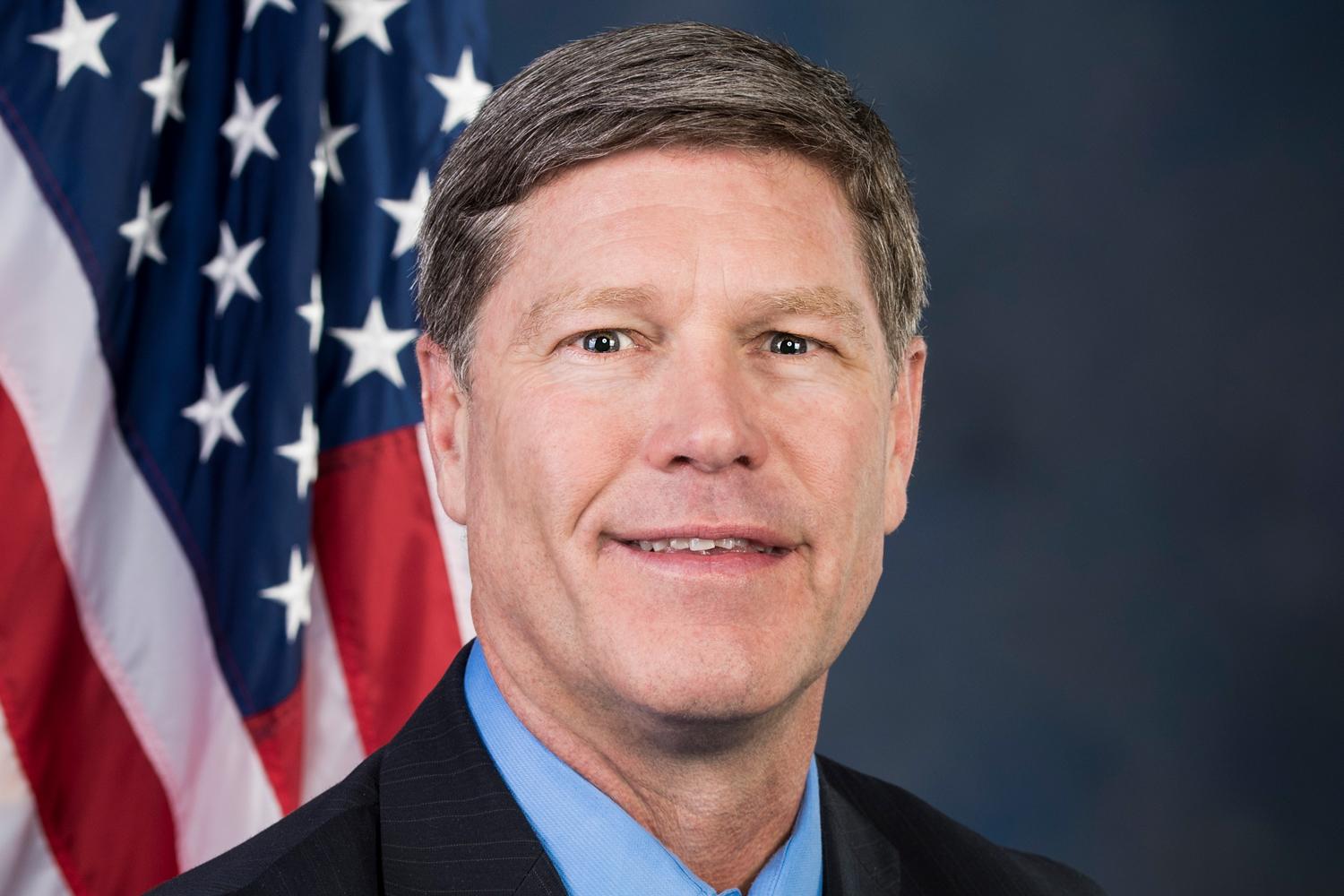

Into the Driftless
In reliably blue Eau Claire, most people who spoke to The Epoch Times at a polling place were Democrats.Aidan Leddick, a student at the nearby university, said the city didn’t feel more conservative than his home, the liberal-leaning Twin Cities. The Minneapolis-St. Paul metroplex sprawls on the other side of the Minnesota state line from northwestern Wisconsin.
The vibe was different in little Gratiot, Wisconsin, the closest spot on the map to the Illinois line in Lafayette County.
Lafayette’s population was 16,611 as of 2020, according to Census data. Gratiot counted 224 residents that year, down from past years.
Early in the evening on Aug. 9, much of Gratiot had squeezed into Rocks Pour House, an old-fashioned inn between Bridge Street (Wisconsin Highway 11) and the Cheese Country Trail. Gratiot’s fire chief, J.R. Kingery, was sitting at the bar next to his sister.
Kingery told The Epoch Times that Lafayette was Trump territory. But as recently as 2012, it went for the Democrat—Obama.
Kingery didn’t recall offhand the GOP nominee that year (former Massachusetts Gov. and current Utah Sen. Mitt Romney).
“Ah—that’s why,” he said.
Romney-style “country club conservatism” didn’t seem like a good fit also for nearby Darlington, Wisconsin, a town of about 2,500 half-encircled by the Pecatonica River. Conservative and Republican signage dominated, though at least one house was adorned with a rainbow flag and other totems of 2024.
In the distance was a low, constant roar: the Lafayette County Speedway was hosting its season championship.
Stock cars flew around the curves, kicking clumps of dirt through chain-link fencing. Families filled bleachers at a safe distance from any flying muck. Teenagers socialized under the stands.




Cars filled the open fields nearby, but few bore political bumper stickers.
Political signage was likewise hard to spot on the route from Darlington to Platteville, home to a branch of the University of Wisconsin, and the biggest thing around save Dubuque, Iowa, on the other side of the Mississippi.
Two Amish men trudged along a busy state highway. Farther west, Kuhls Farm advertised its founding date—1864—on the side of a barn.
“Everybody’s related one manner to the other,” Johnson said of people in nearby Bagley.
At a half-empty bar in Platteville, bikers in leather got into a shouting match, the specifics impossible to hear over the music, before storming out into the street. The college town went for Clinton in 2016 and Biden in 2020. But it is located in Trump-flipped Grant County.
“The big problem that we have right now is that we are just a two-party system, which divide[s] us down the middle,” Mary Matteson, a volunteer at the Grant County Republican Party office, told The Epoch Times late on the morning of Aug. 10.
“Right now, my heart says the best man for the job is Donald J. Trump and JD Vance,” Matteson said. She says that she feels the Democratic Party is currently “full of radicals.”
She and another volunteer, Derek Bartels, were handing out literature and reminding people to register to vote ahead of the state’s Aug. 13 primary.
The county Democrats’ office, just down the street, was closed.
Matteson and Bartels doubt Walz’s Upper Midwestern connection will help Harris in the area. Matteson cited the 2020 riots in Minneapolis as a source of concern for voters.
Like others who spoke to The Epoch Times, Bartels said Trump’s business background helped him win over voters in purple western Wisconsin.
Across the street, at the public library, a flyer advertised a drag queen story hour at a bookstore in Mineral Point.
Meanwhile, the Mining and Rollo Jamison Museums—a tribute to the region’s zinc and lead mining heritage—were hosting Mine Day.
On a small stage in an open field, women sang a Carter Family bluegrass standard in close harmony: “It makes me homesick to hear your name and hold you dear in my arms again. I’m-a-gonna ride that old lonesome train.…”
Not far away, Forrest Rische was picking at his bass under a tent.



“I’m 100 percent all-American to the bone,” he told The Epoch Times.
He said he believes freedom is “done” for the country if Trump isn’t elected.
Dr. David Miller, who had been chatting with Rische about the gold standard, showed The Epoch Times a photo of himself dressed as Kaiser Wilhelm II.
He said he isn’t terribly interested in the upcoming presidential election.
“I’m a monarchist. I believe in the divine right of kings,” Miller said.
Trump signs were thick on the road to Bagley, though the most eye-catching messages were spray-painted on a clutch of buildings under a big limestone cut: “America,” “No More Nice Guy,” “Welcome to Deliverance, Did You Bring Your Banjos,” and “Stay Behind the Gun Line.”
The same railroad that slices through Bagley splits Prairie du Chien in two. One bar, Frazier’s Old Faithful Inn, sits just a few feet from the tracks. It sells t-shirts emblazoned with an image of the train that, much to everyone’s delight, drowns out conversations.
Home to a prison and a 3M plant, Prairie du Chien narrowly favored Biden in 2020 and Clinton in 2016. It’s the seat of Crawford County, another county that flipped to Trump eight years ago. The city is also Van Orden’s home base; like Bagley and Gratiot, it has leached population in recent years.
On the evening of Aug. 10—a Saturday—the county Democrats’ Blackhawk Avenue office was closed. A few doors down, Unicycle Michael, the Driftless Personality, was preparing to perform at The Tavern.
Bluegrass, he said, had dug a deep groove into the Mississippi Valley. His sound, though, is a little different.
“I kind of describe my style as between James Brown and the Grateful Dead,” said Unicycle Michael—real name Michael Zernia.
He said he thinks there’s a mix of political views in the area, but that The Tavern isn’t really the place to talk politics.
“We have a space where we can all get along,” he told The Epoch Times. “It just makes us human to enjoy music.”




Fentanyl in ‘Vacationland’
Lynn Fitch, Sawyer County’s clerk, told The Epoch Times that the border and the economy seem to be big concerns for voters in the area, although “women’s rights” were also a very active issue.Come November, Fitch and other county clerks across the state will be administering the closely watched presidential election.
“We try to keep our poll books clean,” Fitch said of Sawyer County’s records.
In Hayward, anti-fentanyl signage lined the roads. The signs showed a beautiful young face: Cassidy Joy Metropulos, a Hayward High School graduate who died of an overdose at just 21.
“I think that there’s a lot of people that are either related to or know of somebody that has had a significant impact from drugs,” Joan Cervenka, the local Democrat, told The Epoch Times.
Hayward is growing, and the economy isn’t so bad. Fitch said the summer had been a good one for tourism, in line with recent trends.
“We live in a beautiful part of the state, so recreation is really big,” Miller said, before adding a caveat about the region’s attractiveness to older Americans.
Juneau County After Trump
Why did Patricia Turkington and her partner convert New Lisbon’s old Masonic Lodge into a space for the local GOP?“I love Donald Trump,” she told The Epoch Times on Aug. 12.
She and her partner, Marv Newlun, were sitting in that party building in Juneau County—another former bellwether that turned to Trump in 2016 and never went back.

Newlun said he thinks Trump flipped the county from Obama “on his own.”
The New Lisbon City Council member told The Epoch Times that, in 2016, Democrats in the area would come up to him and say they were voting for the businessman.
Turkington, whose three children served in the military, told The Epoch Times that the former president’s anti-war message resonated with her.
“That’s our sons!” she said.
In 2020, Trump strengthened his performance in the growing county, winning about 65 percent of the vote.
The enthusiasm was evident elsewhere in New Lisbon on Aug. 13. At a gas pump on the outskirts of town, Stan Benson’s UTV displayed a “Trump 2024” flag.
“If they object to it, they object,” he said when asked how he’d respond to someone who took issue with his flag.
While Juneau is clearly Trump country, Biden’s 2020 performance was a little stronger in Mauston than in New Lisbon. On the road into town, parallel to another old train line, pro-Trump houses dueled with those decked in more liberal signage. In the realm of symbols, at least, Mauston looked to be at war with itself.
“Once Trump came into the picture, it felt like there was a lot of hate that was released,” Diane Dahl told The Epoch Times. A song from Bob Dylan’s “Blood on the Tracks” played in the background.
She owns the building housing the Juneau County Democrats. Their office adjoins her art gallery, “Oh! Arts.”
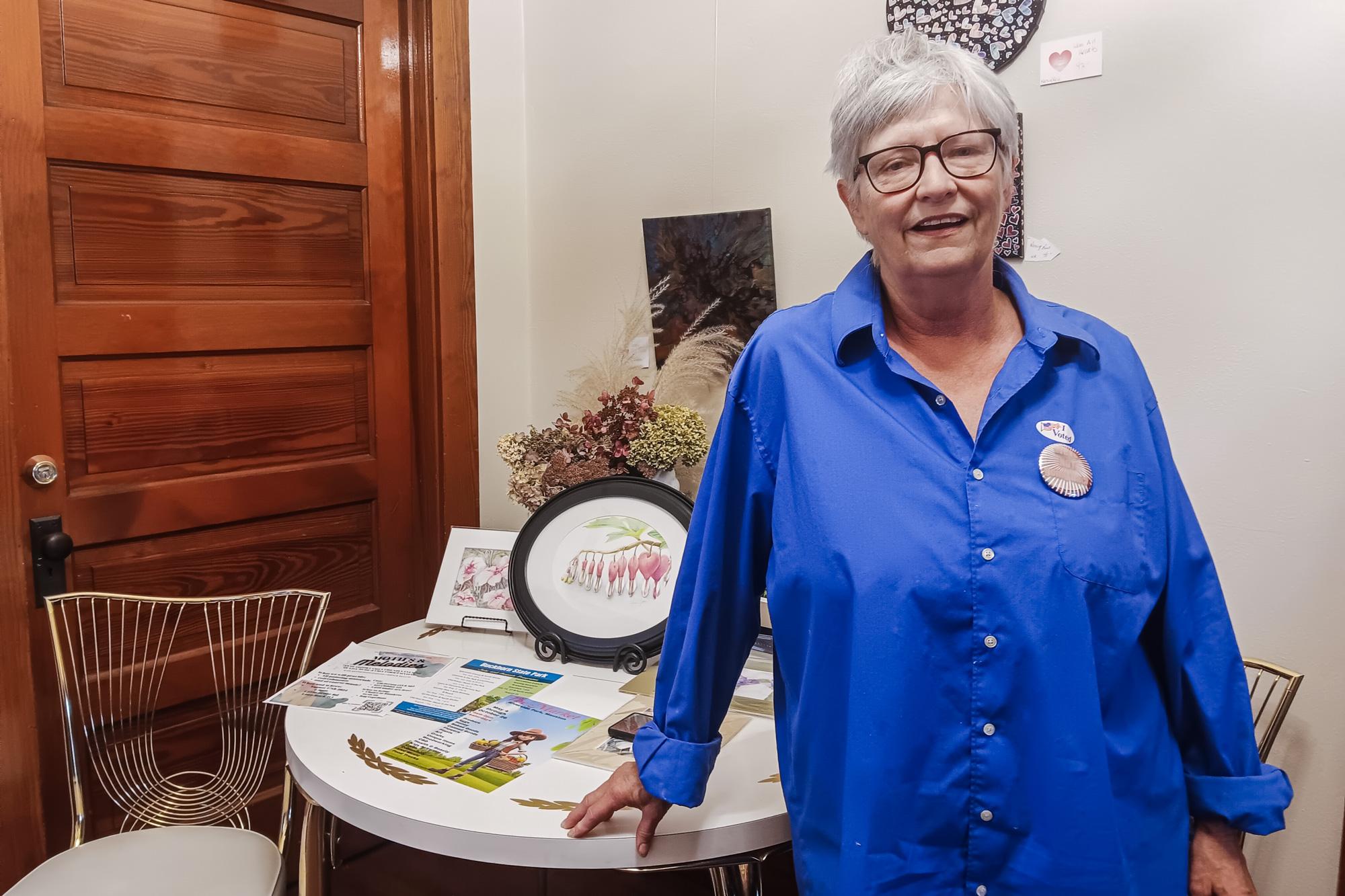
The Democratic primary voter said she was harassed by pro-Trump locals in various ways, including through the regular placement of dead animals on her doorstep. She worries there could be “some kind of weird backlash” if Trump loses in November.
“We can hope,” Dahl said when asked if she thinks the county could flip back to the Democrats. She said the replacement of Biden by Harris raised interest in the local party.
Michele Baumel, a Republican and the owner of the Reel Inn restaurant and campground in nearby Necedah, Wisconsin, said she runs into many pro-Trump Americans who don’t bother to vote.
“‘My vote doesn’t count,’ that’s what they say,” she said.
“There were a lot more union jobs around here,” said her partner, Dennis Gerke, when asked why Juneau used to go for Democrats. He’s a Trump voter from a family of traditional union Democrats in Janesville, Wisconsin.
“I know a lot of people who’ve changed from Democrat to Republican since 2020,” Gerke added, suggesting that this included many military and union families. The two didn’t know of anyone who went the other way.

As recently as 2016, he liked what he heard from Sen. Bernie Sanders (I-Vt.)—“other than his socialist bullcrap.”
During an Aug. 14 press conference, Eric Hovde predicted to The Epoch Times that the Trump campaign would step up its rallies in Wisconsin as his Democrat rivals intensify their campaigning in the state.
Harris held a rally in Milwaukee on the second day of the Democratic National Convention, the latest of her large-scale Wisconsin campaign events.
Trump, meanwhile, hosted a town hall in La Crosse, the heart of Van Orden’s district, on Aug. 29. The moderator: ex-Democrat former Rep. Tulsi Gabbard of Hawaii.
As Trump seeks to draw in independents and disaffected Democrats, deep purple, motorcycle- and ATV-loving western Wisconsin is worth watching.
